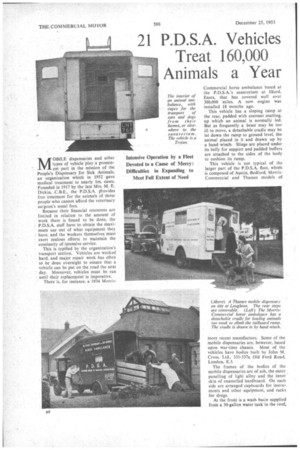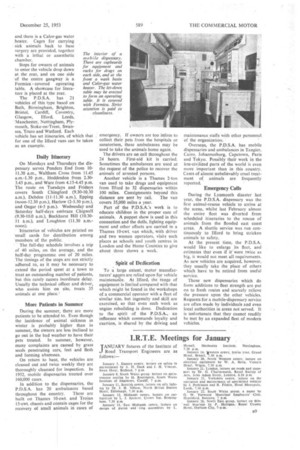21 P.D.S.A. Vehicles Treat 160,000 Animals a Year
Page 34

Page 35

If you've noticed an error in this article please click here to report it so we can fix it.
MOBILE dispensaries and other types of vehicle play a prominent part in the mission of the People's Dispensary for Sick Animals, an organization which in 1952 gave medical treatment to nearly lm. cases. Founded in 1917 by the late Mrs. M. E. Dickin, C.B.E., the P.D.S.A. PI-ovides free treatment for the animals of those people who cannot afford the veterinary surgeon's usual fees.
Because their financial resources are limited in relation to the amount of work there is found to be done, the P.D.S.A. staff have to obtain the maximum use out of what equipment they have, and the workers themselves must exert zealous efforts to maintain the continuity of intensive service.
This is typified by the organization's transport section. Vehicles are worked hard, and major repair work has often to be done overnight to ensure that a vehicle can be put on the road the next day. Moreover, vehicles must be run until their replacement is imperative.
There is. for instance. a 1934 Morris
Commercial horse ambulance based at the P.D.S.A.'s sanatorium at Ilford, Essex, that has covered well over 300,000 miles. A new engine was installed 18 months ago.
This vehicle has a sloping ramp at the rear, padded with coconut matting, up which an animal is normally led. But as frequently a beast may be too ill to move, a detachable cradle may be let down the ramp to ground level, the animal placed in it and drawn up by a hand winch. Slings are placed under its belly for support and padded buffers are attached to the sides of the body to cushion its rump.
This vehicle is not typical of the larger part of the P.D.S.A. fleet, whieh is composed of Austin, Bedford, MorrisCommercial and Thames models of more recent manufacture. Some of the mobile dispensaries are, however, based upon war-time chassis. Most of the vehicles have bodies built by John M. Cross, Ltd., 331-337a Old Ford Road, London, E.3.
The frames of the bodies of the mobile dispensaries are of ash, the outer panelling of light alloy and the inner skin of enamelled hardboard. On each side are arranged cupboards for instruments and other equipment, and racks for drugs.
At the front is a wash basin supplied from a 30-gallon water tank in the roof, and there is a Calor-gas water heater. Cages for carrying sick animals back to base surgery are provided, together with a lethal or anwsthetic chamber.
Steps for owners of animals to enter the vehicle drop down at the rear, and on one side of the centre gangway is a Formica covered operating table. A-showcase for literature is placed at• the rear.
The P.D.S.A. has 21 "vehicles of this type based on Bath, Birmingham, Brighton, Bristol, Cardiff, Coventry, Glasgow, Ilford, Leeds, 'Manchester, Nottingham, Plymouth, Stoke-on-Trent, Swansea, Truro and Watford. Each vehicle has set itineraries, of which that for one of the Ilford vans can be taken • as an example.
Daily Itinerary
On Mondays and Thursdays the dispensary serves Ponders End from 10
1.30 a.m., Waltham Cross from 11.45 a.m.-1.30 p.m., Hoddesdon from 2.303.45 p.m., and Ware from 4.15-4.45 p.m. The route on Tuesdays and Fridays covers South Chingford (9.30-10.30 a.m.), Debden (11-11.30a.m.), Epping (noon-12.30 p.m), Harlow (2-3.30 p.m.), and Ongar (4-5 p.m.). • Wednesday and Saturday half-days embrace Chigwell -(9.30-10.0 a.m.), Buckhurst Hill (10.30'11 a.m.), and Loughton (11.30 am.noon).
Itineraries of vehicles are printed on 'small cards for distribution among -members of the public.
The full-day schedule involves a trip of 40 miles, on the average, and the half-day programme one of 20 miles. The timings of the stops are not strictly adhered to, as it may be necessary to .extend the period spent at a town to treat an outstanding number of patients, but this rarely causes inordinate delay. Usually the technical officer and driver, who assists him on site treats 35 animals at one place.'
More Patients in Summer
During the summer, there are more patients to be attended to. Even though the incidence of animal sickness in winter is probably higher than in summer, the owners are less inclined to go out in the bad weather to have their pets treated. In summer, however, many complaints aro caused by grass seeds penetrating ears, feet and flesh and forming abscesses.
On return to base, the vehicles are cleaned out and twice weekly they are thoroughly cleansed for inspection. In 1952, mobile dispensaries treated over 160,000 cases.
In addition to the dispensaries, the P.D.S.A. has 20 ambulances based throughout the country. These are built on Thames 10-cwt. and Trojan 15-cwt. chassis and contain cages for the recovery of small animals in cases of emergency. If owners are too infirm to collect their pets from the hospitals or sanatorium, these ambulances may be used to take the animals home again.
The drivers are on call throughout the 24 hours. First-aid kit is carried. Sometimes the ambulances are used at the request of the police to recover the animals of arrested persons.
Another vehicle is a Thames 2-ton van used to take drugs and equipment from Ilford to 32 dispensaries within 100 miles. Consignments beyond this distance are sent by rail. The van covers 35,000 miles a year.
Part of the P.D.S.A.'s work is to educate children in the proper care of animals. A puppet show is used in this connection and the dolls, lighting equipment and other effects are carried in a Thames 10-cwt. van which, with driver and two women operators, visits such places as schools and youth centres in London and the Home Counties to give about three shows a week.
Spirit of Dedication To a large extent, motor manufacturers' agents are relied upon for .vehicle maintenance. At Ilford, the range of equipment is limited compared with that which might be found in the workshops of a commercial operator with a fleet of similar size, but ingenuity and skill are exercised, so that even such work as engine rebuilding is done. Dedication to the spirit of the P.D.S.A., an
• influence Which commands loyalty and exertion, is shared by the driving and maintenance staffs with other personnel of the organization.
Overseas, the P.D.S.A. has mobile dispensaries and ambulances in Tangier, Cairo, Johannesburg, Capelown, Paris and Tokyo. Possibly their work in the less-civilized parts of the world is even more important than in this country. Cases of almost unbelievably cruel treatment of animals are frequently reported.
Emergency Calls
During the Lynmouth disaster last year, the P.D.S.A. dispensary was the first animal-rescue vehicle to arrive at the scene, whilst last February almost the entire fleet was diverted from scheduled itineraries to the rescue of animals from the flooded east coast areas. A shuttle service was run continuously to Ilford to bring stricken animals to safety.
At the present time, the P.D.S.A. would like to enlarge its fleet, and estimates that even if it/. were twice as big, it would not meet all requirements. As new vehicles are acquired, however, they usually take the place of others which have to be retired from useful service.
Those new dispensaries which do form additions to fleet strength are put on to fresh routes and scarcely relieve the pressure upon the other vehicles. Requests for a mobile-dispensary service are often made by individuals and even local authorities in areas not served. It is unfortunate that they cannot readily be met by an expanded fleet of modern vehicles.












































































